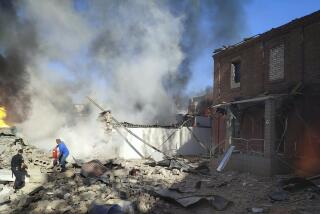Japan’s nuclear crisis felt in Europe
Reporting from London — The political and environmental shockwaves of the Japanese earthquake reached Europe on Monday as Germany and Switzerland moved to curb their nuclear energy programs, at least temporarily.
The Swiss government imposed an immediate freeze on plans to build and replace nuclear power plants until inspectors review safety standards in light of developments in Japan, where last Friday’s monster earthquake and ensuing tsunami have put nuclear power stations at risk.
Switzerland relies on five reactors for 40% of its energy supply. But earthquakes are not unknown in the Alpine nation. Swiss Energy Minister Doris Leuthard said human welfare had to take the “highest priority” and that a moratorium on construction was justified, especially if upgraded seismic safety procedures are deemed necessary.
Photos: Scenes of earthquake destruction
In neighboring Germany, Chancellor Angela Merkel announced that her government’s decision to extend the life of the country’s nuclear plants would be put on hold for three months. In addition, two older nuclear power stations may be taken off-line while a full safety investigation is carried out.
Originally, all 17 of Germany’s nuclear plants were to close by the beginning of the next decade, but Merkel moved last year to extend their lifetimes by an average of 12 years.
The decision has been unpopular. On Saturday, tens of thousands of protesters formed a human chain around a plant in southwestern Germany.
Merkel, whose party is facing tough local elections this month, told reporters Monday that officials would use the three-month suspension to explore ways to move the country toward using renewable energy.
The events in Japan are clearly a setback for atomic energy in Europe, which in the last few years has undergone something of a “nuclear spring.” Faced not only with steadily rising energy needs but also demands to rein in fossil fuel emissions, a number of nations in the region have revived or ramped up plans to build more nuclear power stations.
The world’s largest nuclear plant is under construction in Finland. Poland wants to build two on the edge of the Baltic Sea. Italy intends to start building its first plant in 2013 and remains committed to that goal despite the crisis unfolding in Japan, Italian officials said Monday.
Sweden, which was expected to shut down its 10 nuclear plants last year, abruptly reversed course in 2009, saying it would not only keep them running but allow them to replace their reactors if necessary.
But public opposition could harden as a result of the disaster halfway around the globe. In Sweden, for example, residents alarmed by the meltdown at Three Mile Island in the United States overwhelmingly voted in 1980 to ban further expansion of nuclear power.
The European Union has called an emergency meeting Tuesday of the region’s energy ministers. Austria’s environment minister has urged countries to conduct “stress tests” of their nuclear industries.
In Britain, the government has asked its chief nuclear inspector for a thorough report on the implications of the situation in Japan.
“If there are lessons to learn, we must learn them,” Prime Minister David Cameron told Parliament on Monday.
Photos: Scenes of earthquake destruction
More to Read
Sign up for Essential California
The most important California stories and recommendations in your inbox every morning.
You may occasionally receive promotional content from the Los Angeles Times.











